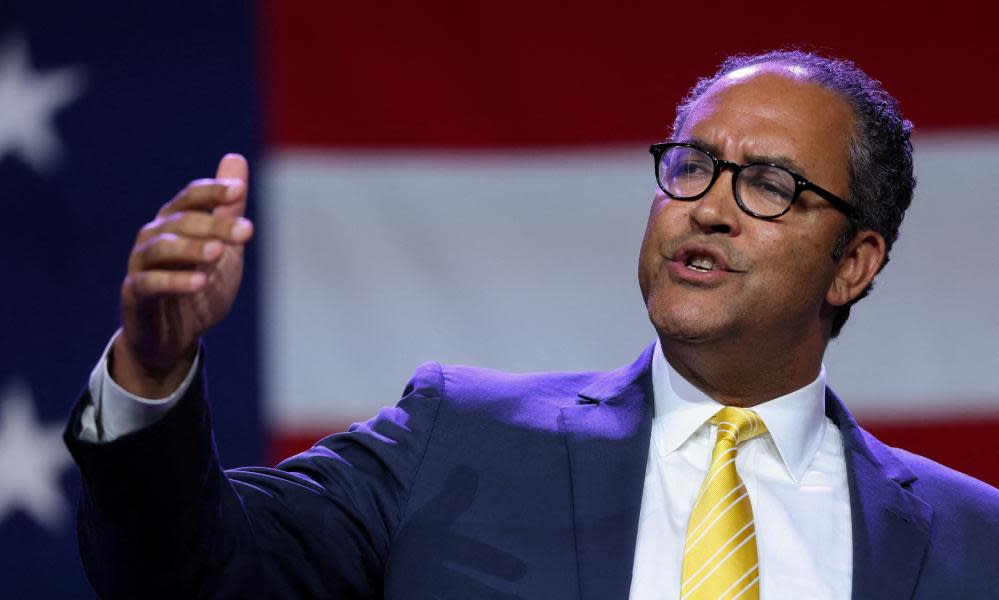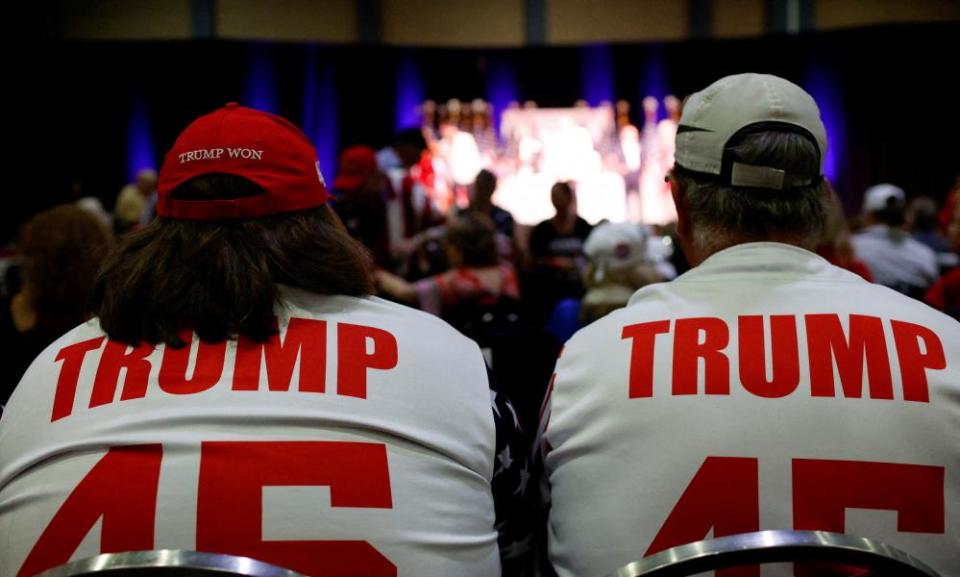Republican Will Hurd on his failed quest for president: ‘I’m going to always look at this fondly’

Will Hurd wanted to be the most powerful man in the world. Like so many candidates before him, he knew the loneliness of the long distance runner criss-crossing Iowa and New Hampshire in a quest for votes that might make him president of the United States. But it was not be.
This week Hurd called it a day after a campaign that failed to make much of a splash. Indeed, arguably his biggest headline came in July when he declared, “Donald Trump is running to stay out of prison,” and was roundly booed at the Iowa Republican Party’s Lincoln Dinner. Unrepentant, Hurd told them: “Listen, I know the truth is hard.”
It was a telling moment that said much about the Republican party in 2023, cult-like in its devotion to Trump – he remains the runaway favourite for the nomination – and blocking its ears to dissenters making the case that it is time to move on from a doubly impeached, quadruply indicted septuagenarian.
Still, in a phone interview from his home in San Antonio, Texas, Hurd – who got married last New Year’s Eve – insists that he has no regrets. “Look, running for president in my first year of marriage was incredibly difficult and it goes back to: why are you doing it?” he says. “For me, it was always very clear.
“I’ve been lucky to have some amazing experiences and America is at an inflection point: if we want to make sure we leave this country better off for our kids, we’ve got to start making better decisions now. For me, that was always in my mind, that’s everything that I focused on when I woke up. It was never like, why the hell am I doing this? I knew exactly why I was doing this.”
Hurd, 46, is no stranger to the campaign trail. He served three terms in the House of Representatives and was the chamber’s sole Black Republican during his final two years in office. He represented Texas’s then-most competitive district, which was heavily Hispanic and stretched from the outskirts of San Antonio to El Paso, spanning more than 800 miles of US-Mexico border.
But with the Republican party still in thrall to Trump, Hurd, a trenchant critic of the then president, chose not to seek re-election in 2020, saying he would instead focus his energies on technology companies in the national security domain. Last year he travelled the country promoting his book American Reboot: An Idealist’s Guide to Getting Big Things Done.
Hurd was the last major candidate to join the already crowded Republican presidential primary field when he announced his run in late July. He campaigned as a pragmatic, pro-business moderate with strong national security credentials who was unafraid to seek bipartisan consensus. He took on the grind of countless hours on planes, in hotels and away from family with good grace.
“What is it like to run for president?” he muses. “It’s a lot of travel. It’s a lot of interviews. I have the experience of running for Congress before but running for president, because you’re doing so much, is more raw and authentic. It’s not as staged as some of the other experiences I’ve had. To be in a position to run for president and be taken seriously was an honour. I’m going to always look at this experience fondly.”
Hurd’s 14-week foray delivered moments he won’t soon forget. On September 11 he joined first responders and people from Iowa on a 21-mile walking salute to those who died in the 9/11 terrorist attacks on New York and Washington. At campaign stops, the crowds were often bigger than he expected or had experienced when hustling as a relative unknown in west Texas.
“You’d meet some great people. I met this seven-year-old kid in New Hampshire who was super space and the fact that he asked his dad to travel like 90 minutes to come see me talk because he read something I wrote about space. That’s pretty big and cool.”
Nine in 10 people in Iowa and New Hampshire are white. Democrats, for their part, have revised their 2024 presidential primary schedule, replacing Iowa with the more racially diverse South Carolina as the leadoff voting state. Hurd, the son of a Black father and white mother, has written about the racism he endured as a teenager and entitled the first part of his book: “The GOP needs to look like America.”
But he denies encountering racial prejudice on the trail. “I did not experience any of that. The folks in Iowa and New Hampshire recognise and understand the important role they play in setting the tone of the country and part of that is why a dark horse candidate like me even had a chance to potentially try to catch fire.”
Even so, it has been hard for anyone to find a divine spark when confronting the Trump forest fire that has consumed the Republican party for eight years. Florida governor Ron DeSantis’s challenge faded in recent months while other candidates struggled to transcend the quixotic.

Asked if there was a moment when they all realised just how formidable Trump still is, notwithstanding his electoral setbacks and legal woes, Hurd replies: “I went in with that clear-minded. I knew that Donald Trump was starting with the largest base and in a place like New Hampshire I think that’s a third of the electorate, a third of the Republican primary voter.
“But there’s more people that are considering somebody other than Donald Trump. There are other people that are frustrated with the direction both parties are going that want to be inspired. I also evaluate that in 2020 his support in the Republican primary electorate was 98% so he is without doubt damaged goods. People that voted for Donald Trump twice that still like him recognise his baggage is going to be more harmful than helpful.”
What were Hurd’s conversations with Trump supporters like on the campaign trail – did he try to change their minds? “It’s funny, a couple times, especially in New Hampshire, you show up somewhere and someone’s wearing a Trump hat and then after you speak they’re like, ‘Can we get a picture?’ and they take the Trump hat off.
“Supporters of other candidates – that’s their right and they should be proud of that. But the opportunity to articulate my positions was great and so I did that everywhere and people were open to having a conversation and I always engage people regardless of who they ultimately supported.
“What makes this country great is to be able to have that competition of ideas and this experience proved to me, especially on the ground, we can disagree without being disagreeable and I saw that with the actual voters. I’m optimistic about the future of the country because of the people that I met.”
But Hurd and his fellow candidates have faced their share of criticism for, at best, embarking on vanity projects with a view to becoming a TV pundit or Trump’s vice president and, at worst, splitting the anti-Trump vote and effectively handing him the nomination. He rejects the charge.
“The Republican party is supposed to be the party of the competition of ideas. We’re meant to have a diversity of thought and I’ve always said that having a number of people to put their message out there and offer different perspectives is valuable. Donald Trump as the GOP nominee is not inevitable but we put ourselves in a better position by starting to consolidate if there’s not a clear path to victory.”
For all his efforts, Hurd barely registered in opinion polls of Republican voters. When he failed to qualify for the first two presidential primary debates in Milwaukee, Wisconsin and Simi Valley, California, the writing was on the wall. This week he followed Miami mayor Francis Suarez, who became the first presidential hopeful to suspend his campaign shortly after failing to make the first debate stage.
He explains: “I’ve always been honest, and so when I knew that our pathway to victory was going to be incredibly tough, I had to be honest with supporters and event planners and people that were hosting things, and so that’s why the timeline is what it is.”
Hurd is throwing his weight behind Nikki Haley, the former governor of South Carolina and ex-US ambassador to the UN, who has been steadily gaining ground as the leading Trump alternative. Her campaign reported that she raised more than $11m between July and September and this week George Will, an influential Washington Post columnist, called on South Carolina senator Tim Scott and other contenders to drop out and rally around the “experienced, polished, steely and unintimidated” Haley.
Hurd says: “Running for president is as much about organisation as it is ideas and she has been able to do that. When it comes to areas like how do you create a strong economy, how you deal with our foreign policy, those are things that I’m aligned with her and she has the best chance. There’s a lot of great people in this race and a lot of them are my friends but Nikki has the momentum to win.”
Hurd joined the CIA in 2000 and, after 9/11, spent eight years on the frontlines of the “war on terror” including Pakistan, India and Afghanistan. Now the world again appears to be catching fire with unpredictable consequences. While Trump and others preach “America First” isolationism, Hurd believes that Haley, a former US ambassador to the UN, is most able to meet the moment.
“People are nervous, especially with what’s happening now in Israel, two wars going on, the threat that the Chinese government poses to the US and our allies,” he adds. “People want a leader who understands these issues, who’s going to have a steady hand, and right now that’s Ambassador Haley.”
Hurd sounds upbeat for a man who has just joined all those other White House hopefuls on the boulevard of broken dreams. His bio on X, the platform formerly known as Twitter, still describes him as “Candidate for President. Common sense Republican. Husband.”
Anyone seeking Hurd 2024 merchandise on his campaign website, however, might be out of luck. “No products were found matching your selection,” it says.

 Yahoo News
Yahoo News 
